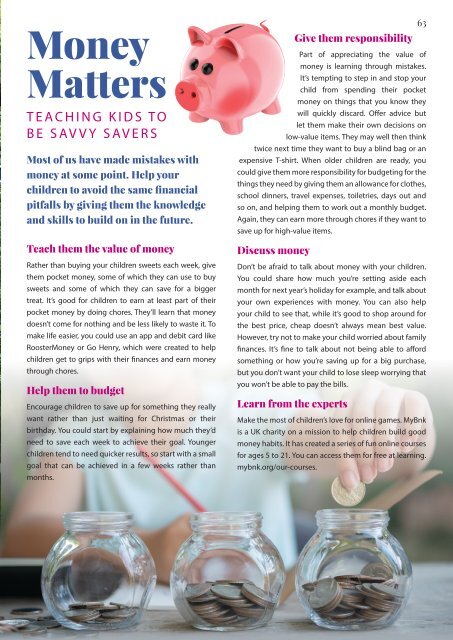You also want an ePaper? Increase the reach of your titles
YUMPU automatically turns print PDFs into web optimized ePapers that Google loves.
Money<br />
Matters<br />
TEACHING KIDS TO<br />
BE SAVVY SAVERS<br />
Most of us have made mistakes with<br />
money at some point. Help your<br />
children to avoid the same financial<br />
pitfalls by giving them the knowledge<br />
and skills to build on in the future.<br />
Teach them the value of money<br />
Rather than buying your children sweets each week, give<br />
them pocket money, some of which they can use to buy<br />
sweets and some of which they can save for a bigger<br />
treat. It’s good for children to earn at least part of their<br />
pocket money by doing chores. They’ll learn that money<br />
doesn’t come for nothing and be less likely to waste it. To<br />
make life easier, you could use an app and debit card like<br />
RoosterMoney or Go Henry, which were created to help<br />
children get to grips with their finances and earn money<br />
through chores.<br />
Help them to budget<br />
Encourage children to save up for something they really<br />
want rather than just waiting for Christmas or their<br />
birthday. You could start by explaining how much they’d<br />
need to save each week to achieve their goal. Younger<br />
children tend to need quicker results, so start with a small<br />
goal that can be achieved in a few weeks rather than<br />
months.<br />
63<br />
Give them responsibility<br />
Part of appreciating the value of<br />
money is learning through mistakes.<br />
It’s tempting to step in and stop your<br />
child from spending their pocket<br />
money on things that you know they<br />
will quickly discard. Offer advice but<br />
let them make their own decisions on<br />
low-value items. They may well then think<br />
twice next time they want to buy a blind bag or an<br />
expensive T-shirt. When older children are ready, you<br />
could give them more responsibility for budgeting for the<br />
things they need by giving them an allowance for clothes,<br />
school dinners, travel expenses, toiletries, days out and<br />
so on, and helping them to work out a monthly budget.<br />
Again, they can earn more through chores if they want to<br />
save up for high-value items.<br />
Discuss money<br />
Don’t be afraid to talk about money with your children.<br />
You could share how much you’re setting aside each<br />
month for next year’s holiday for example, and talk about<br />
your own experiences with money. You can also help<br />
your child to see that, while it’s good to shop around for<br />
the best price, cheap doesn’t always mean best value.<br />
However, try not to make your child worried about family<br />
finances. It’s fine to talk about not being able to afford<br />
something or how you’re saving up for a big purchase,<br />
but you don’t want your child to lose sleep worrying that<br />
you won’t be able to pay the bills.<br />
Learn from the experts<br />
Make the most of children’s love for online games. MyBnk<br />
is a UK charity on a mission to help children build good<br />
money habits. It has created a series of fun online courses<br />
for ages 5 to 21. You can access them for free at learning.<br />
mybnk.org/our-courses.

















